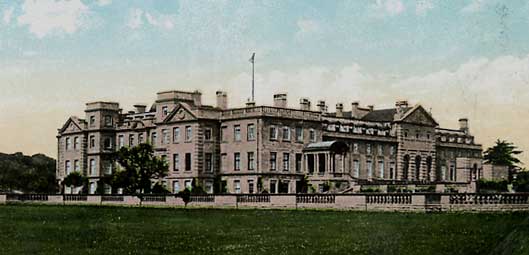Ottoline and her daughter Julian.
Ottoline was born on June 16, 1873 to parents Lieutenant-General Arthur Bentinck, colonel of the 7th Dragoon Guards-imposing -but known for a booming laugh, her mother- Augusta Mary Elizabeth- daughter of the dean of Lismore. She was Bentinck's second wife. Three older brothers to take care of her, and a half brother-Arthur-who upon the early death of his father, became the family anchor for his father's widow and children-and the 6th Duke of Portland.
Ottoline was born into a life of privilege but she was never to conform to its strict codes-marry well and within the aristocracy, join weekend hunting parties & do the London Season-then start it over again.
Ottoline was different. Maybe more the stuff of her early female ancestors.
Margaret Cavendish(Harley),Duchess of Portland, William Bentinck,,
2nd Duke of Portland; Lady Mary Wortley Montagu
by George Vertue
Margaret Cavendish(Harley),Duchess of Portland
Friend Lytton Strachey put it this way-she was the daughter of a thousand earls. The names of Talbots, Cavendishes, Bentincks, stand out while three women within her lineage point- Bess of Hardwick, founder of the Cavendish line, Margaret, first Duchess of New Castle, also known as "Mad Madge" a real bluestocking and Margaret Cavendish-Holles-Harley who married the 2nd Duke of Portland- creating the Cavendish-Bentinck line in 1734. With that lineage-& her curiosity Ottoline quickly embraced her ancestry and found heroines behind every door.
Welbeck ,c.1900
Mrs. Bentinck began the arduous task of sorting through all of the Welbeck treasures- of which there were countless- and in turn giving Ottoline lessons in the family history.
our Ottline, age 5
The Sixth Duke-after his marriage and his wife, Winifred (Nee Dallas-Yorke)
According to a recent article in the mail online on the BBC production of Downton Abbey (of Ottoline's era):
At Welbeck Abbey, the Duke of Portland had more than 60 staff in the house, with a further 200 labouring away in the stables, gardens and home farm. In today’s Britain, that number of employees would be categorised as a big business. Welbeck’s annual Servants’ Ball was so huge and so grand that an orchestra and 50 waiters had to be brought in from London.
Ottoline's Playground- Welbeck
images from Country Life in the early 1900's
The Swan Drawing Room
The Gallery of Prints
The Titchfield Library
The Great Ballroom
The Red Withdrawing Room, The Gothic Hall
Our little Ottoline play things from the family's estate
Charles I 's pearl earring, (the doomed monarch and the earring-both at his execution), & a dagger thought to have belonged to Henry VIII (now believed by the Harley Gallery to be Turkish, 17th c.)
Charles I, van dyck- Charles I pearl earring from the Harley Gallery Welbeck, Worksop
& dagger from WoI 2008
She relied on Welbeck's servants for company, her brothers off at Eton, paid little attention to their sister. She was dressed by a maid, bows tied, petticoats lifted, shoes buckled. She could drive her miniature phaeton drawn by Shetland ponies about Sherwood forest on the rare occasion her cousin would visit Welbeck. An education consisting of Scripture served up by her governess Miss Craig along with a dose of obligatory needlework. She learned the basics-but nothing of science and literature-perhaps one reason for surrounding herself with the great minds of the day- philosophers, writers and artists most of her life.
In her room she curtained off an area for her treasures and no one was allowed past. Ottoline was on a quest and her search began with the loneliness she found at Welbeck-for all its advantages.
Welbeck Abbey here here & here
read an entertaining story from the blog 1904 here, about the Sixth Duke
Welbeck Abbey image from here
Charles I pearl earring image from here

















Your description of Ottoline's childhood at Welbeck reminds me very much of Vita Sackville-West's descriptions of hers at Knoll. Vita named all the heraldic panthers atop the bannister posts. Their childhoods seemed lonely, but given that they were both highly imaginative, perhaps they created compensations for themselves. One of my own favorite childhood games was lying on my bed with my head hanging over the edge so my view was completely topsy-turvy, and the ceiling became my floor. What fun I would've had in Welbeck's Gothic Hall! Thank you for sharing the Country Life photos.
ReplyDeleteHere is a little collage and story I made last year, based on an old print of Welbeck:
ReplyDeletehttp://collagitation.blogspot.com/2010/05/3sitxty5-53-discovery-of-extinct-breed.html
Diane I love the collage! thank you for reading. pgt
ReplyDeleteShe is fascinating. I love the thought of patrons and patronesses. She really nurtured artists. More than some will care to admit. What a lovely blog.
ReplyDeleteThe portraits are of Margaret (Lucas) Cavendish, Duchess of Newcastle, yet your image captions name her Duchess of Portland?
ReplyDeleteAnon. I refer you to the following link on the first portrait
ReplyDeletethe Nat Portrait Gallery -
http://www.npgprints.com/image/33605/george-vertue-christian-friedrich-zincke-margaret-cavendish-bentinck-nee-harley-duchess-of-portland-william-bentinck-2nd-duke-of-portland-lady-mary-wortley-montagu
& I did use the wrong photograph 2nd portrait, YOu are correct, though my file is labelled correctly I have used the wrong portrait-I do believe the new portrait is of the Duchess of Portland.